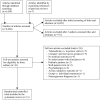The influence of the patient-clinician relationship on healthcare outcomes: a systematic review and meta-analysis of randomized controlled trials
- PMID: 24718585
- PMCID: PMC3981763
- DOI: 10.1371/journal.pone.0094207
The influence of the patient-clinician relationship on healthcare outcomes: a systematic review and meta-analysis of randomized controlled trials
Erratum in
- PLoS One. 2014;9(6):e101191
Abstract
Objective: To determine whether the patient-clinician relationship has a beneficial effect on either objective or validated subjective healthcare outcomes.
Design: Systematic review and meta-analysis.
Data sources: Electronic databases EMBASE and MEDLINE and the reference sections of previous reviews.
Eligibility criteria for selecting studies: Included studies were randomized controlled trials (RCTs) in adult patients in which the patient-clinician relationship was systematically manipulated and healthcare outcomes were either objective (e.g., blood pressure) or validated subjective measures (e.g., pain scores). Studies were excluded if the encounter was a routine physical, or a mental health or substance abuse visit; if the outcome was an intermediate outcome such as patient satisfaction or adherence to treatment; if the patient-clinician relationship was manipulated solely by intervening with patients; or if the duration of the clinical encounter was unequal across conditions.
Results: Thirteen RCTs met eligibility criteria. Observed effect sizes for the individual studies ranged from d = -.23 to .66. Using a random-effects model, the estimate of the overall effect size was small (d = .11), but statistically significant (p = .02).
Conclusions: This systematic review and meta-analysis of RCTs suggests that the patient-clinician relationship has a small, but statistically significant effect on healthcare outcomes. Given that relatively few RCTs met our eligibility criteria, and that the majority of these trials were not specifically designed to test the effect of the patient-clinician relationship on healthcare outcomes, we conclude with a call for more research on this important topic.
Conflict of interest statement
Figures
References
-
- Kleinman A (2013) From illness as culture to caregiving as moral experience. New England Journal of Medicine 368: 1376–1377. - PubMed
-
- Schapira L (2013) The essential elements of a therapeutic presence. Cancer. - PubMed
-
- Astrow AB (2013) Book Review: David Schenck and Larry R. Churchill, Healers: Extraordinary Clinicians at Work. Society 50..
-
- Hojat M, Louis DZ, Markham FW, Wender R, Rabinowitz CG, et al. (2011) Physicians' empathy and clinical outcomes for diabetic patients. Academic Medicine 86: 359–364. - PubMed
-
- Ward MM, Sundaramurthy S, Lotstein D, Bush TM, Neuwelt CM, et al. (2003) Participatory patient-physician communication and morbidity in patients with systemic lupus erythematosus. Arthritis Care and Research 49: 810–818. - PubMed
Publication types
MeSH terms
LinkOut - more resources
Full Text Sources
Other Literature Sources
Medical
Miscellaneous




